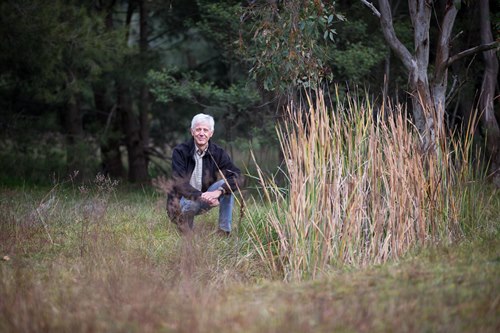Claudia Doman
16 September 2014: The well-known negative effects of land-use change on our biodiversity appear to be rivalled by climate change, according to a comprehensive new analysis of almost 150 worldwide studies by a University of Canberra researcher and his colleagues.
Their findings have been published by Biological Reviews, a biology journal published by the Cambridge Philosophical Society, a scientific society at the University of Cambridge.
University of Canberra Centenary Professor Ralph Mac Nally, co-author of the paper, explained that the world's biodiversity is in free-fall, mostly due to human population growth and the ever-increasing exploitation of natural resources.
"Almost all global indicators are showing that there are fewer populations of plants and animals, and declining numbers of most native species in all ecosystems," Professor Mac Nally, a world-renowned ecologist who joined the University earlier this year, said.
 |
Professor Ralph Mac Nally says climate change is just as severe as vegetation clearance effects on biodiversity. Photo: Katherine Griffiths |
These declines, he added, are due to direct human pressures such as habitat loss or hunting, or indirect pressures, such as climate change arising from human activities.
"Up until now, the effects of climate change on biodiversity had been vaguely articulated, but now we can say that these will be as severe as the well-documented effects of native vegetation clearance," he said.
"Humans change things very quickly: land clearing, the exploitation of natural resources, the introduction of pests and pathogens and induced climate change, but the capacity of ecosystems to absorb these changes is limited and signs of ecological wear-and-tear are everywhere."
Professor Mac Nally and his colleagues compiled the results of 147 empirical studies worldwide to measure how demographic rates were linked to changes in land use and climate change.
"We compared the effect of climate and landscape health on birth, death, immigration and emigration rates in plant and animal populations," he said. "We found that land-use change reduced birth and immigration rates and increased death and emigration rates."
In their paper, the researchers reported that climate changes had effects of a similar magnitude to land-use change. These results suggest that climate change will intensify the adverse effects on native plants and animals caused by the ongoing degradation of landscapes by vegetation clearance and fragmentation.
"We need to think very seriously about the proposals for massive agricultural development in Australia's north, for example. The region is expected to heat dramatically over the next few decades, which would amplify the effects of the proposed widespread loss of native vegetation on our native species," he said.
Professor Mac Nally is one of eight Centenary Research Professors who have joined the University of Canberra to help it become one of the world's top 100 research universities under 50 by 2018.
The Centenary Professors will mentor and inspire the next generation of researchers at the University and will also attract significant research funding.
About Professor Ralph Mac Nally
Professor Mac Nally first trained as a community ecologist but shifted his interest into the emerging disciplines of conservation ecology, landscape ecology, change ecology and ecological futures, with the latter being the focus of much of his current work. He combines elements of research from terrestrial and freshwater ecology with large-scale modelling to treat landscapes as integrated systems.
Professor Mac Nally is the author of the book Ecological Versatility and Community Ecology (Cambridge University Press, 1995) and has published more than 200 peer-reviewed papers.
He has spent sabbaticals at Stanford University (1999) and at the University of Cambridge (2010, 2013) and is involved with conservation and sustainability research in the Projeto Amazônia Sustentável, in Brazil. He is an Australian Research Council (ARC) Discovery Outstanding Researcher and has previously held two ARC senior research fellowships.


